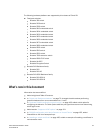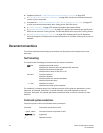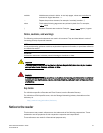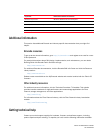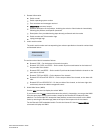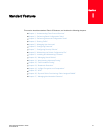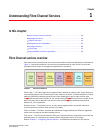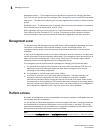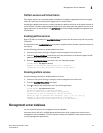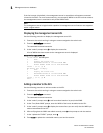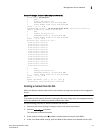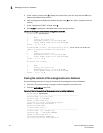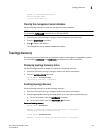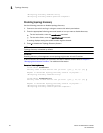
Fabric OS Administrator’s Guide 43
53-1002745-02
Chapter
1
Understanding Fibre Channel Services
In this chapter
•Fibre Channel services overview . . . . . . . . . . . . . . . . . . . . . . . . . . . . . . . . . . 43
•Management server . . . . . . . . . . . . . . . . . . . . . . . . . . . . . . . . . . . . . . . . . . . . 44
•Platform services. . . . . . . . . . . . . . . . . . . . . . . . . . . . . . . . . . . . . . . . . . . . . . . 44
•Management server database . . . . . . . . . . . . . . . . . . . . . . . . . . . . . . . . . . . . 45
•Topology discovery. . . . . . . . . . . . . . . . . . . . . . . . . . . . . . . . . . . . . . . . . . . . . . 49
•Device login . . . . . . . . . . . . . . . . . . . . . . . . . . . . . . . . . . . . . . . . . . . . . . . . . . . 51
•High availability of daemon processes. . . . . . . . . . . . . . . . . . . . . . . . . . . . . . 53
Fibre Channel services overview
Fibre Channel services define service functions that reside at well-know addresses, as illustrated in
Figure 1. A well-known address is a reserved three-byte address for each service. Services are
provided to either nodes or management applications in the fabric.
FIGURE 1 Well-known addresses
Fabric Login — The Fabric Login server assigns a fabric address to a fabric node, which allows it to
communicate with services on the switch or other nodes in the fabric. The fabric address is a 24-bit
address (0x000000) containing three 3-byte nodes. Reading from left to right, the first node
(0x000000) represents the domain ID, the second node (0x000000) the port area number of the
port where the node is attached, and the third node (0x000000) the arbitrated loop physical
address (AL_PA), if applicable.
Directory server — The directory server or name server registers fabric and public nodes and
conducts queries to discover other devices in the fabric.
Fabric controller — The fabric controller provides State Change Notifications (SCNs) to registered
nodes when a change in the fabric topology occurs.
Time server — The time server sends the time to the member switches in the fabric from either the
principal switch or, if configured, the primary fabric configuration server (FCS) switch.
Refer to Chapter 7, “Configuring Security Policies,” for additional information on FCS policies.



